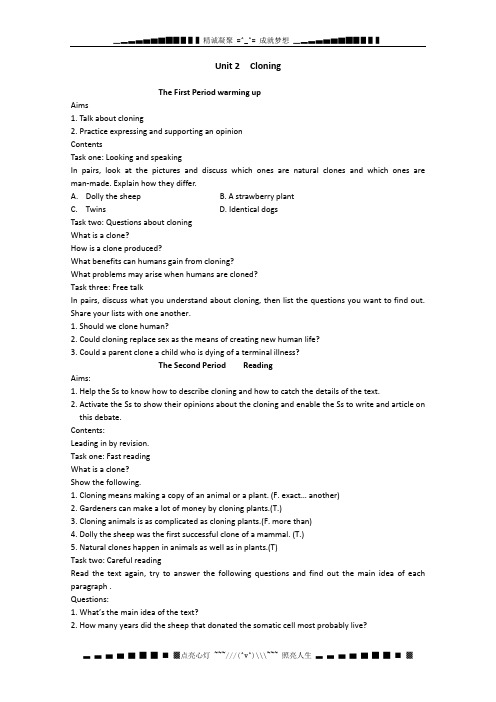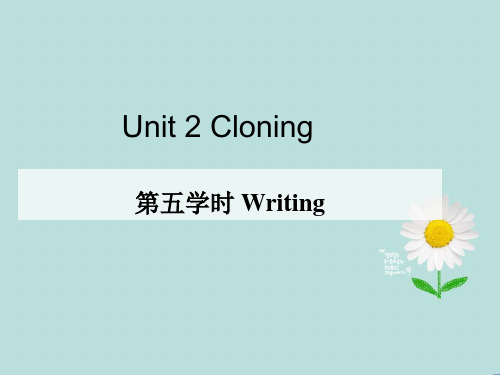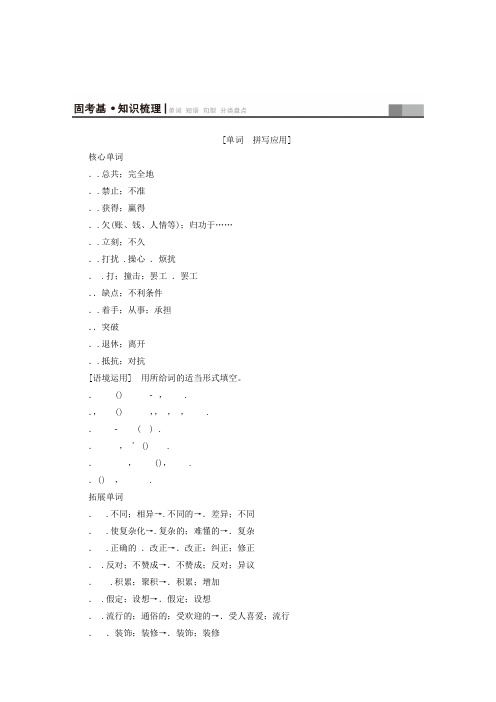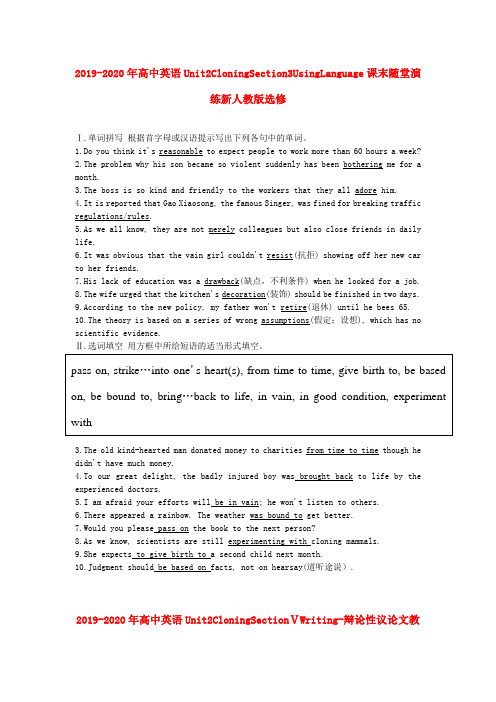2020学年高中英语Unit2CloningSectionⅤWriting_辩论性议论文教学案新人教
- 格式:doc
- 大小:43.00 KB
- 文档页数:4

2022-2021学年高中英语同步教案(4:Unit 2 Cloning人教新课标选修8)The first PeriodStep ⅠRevisionCheck the students’ homework.T: Last class we talked something about cloning. Now, who can show your opinion?S: Let me have a try. In my opinion it is wrong to clone human beings. If my parents decided to have a clone made of me, I would feel very sad and I would never accept the clone as a member of the family or as my friend.T: Good job!Step ⅡWord StudyT: You know it is not enough to recite words. You should also use it often. You must pay more attention to the tenses and voices. For example: The building was restored last year. In this sentence, you must use the words “was” and “restored”. Because the past tense and passive voice are contained in the sentence. Do you understand?S: How can I know the tense and voice?T: You can know it throughout some key words and the meanings of these sentences. Now please open your books and turn to page 13. Look at Learning about Language. First let’s do Ex 1. Complete the fol lowing sentences using suitable words or phrases from the previous sections on page 13.You can look them up in an EE dictionary. Complete the sentences with suitable words in correct forms.Several minutes later, check the answers with the whole class.T: Do you know the meaning of “pretty”?S: It means “piaoliang” in Chinese.T: Can you use another word instead of it in English?S: We can use the words “beautiful” and “lovely”.T: You are right! There are many words that have the same meaning. So when we meet them, we must pay more attention to them. Now let’s look at Ex 2. Rewrite the following sentences using words of the similar meaning to replace the underlined words.Several minutes later, check the answers with the whole class. Then do Ex 3.T: After we can use the words in sentences, we will use it in passages. Now, use the words and phrases below to fill in this passage and then answer my questions.Questions:1. What did Freddy want to do when he grew older?2. What did Freddy want to do when the dream that one could live forever now seemed impossible?T: Who can answer my questions? The first one: What did Freddy want to do when he grew older?S1: He wanted to undertake cloning so that his musical career could continue.T: Very good! What about the second one? S2: He made up his mind to enjoy his singing and accumulate many happy experiences so that when he retired he would be able to look back on his life with a great pleasure.T: Good job!Step ⅢRole-play (Ex 4)T: Now, read the questions and answers and underline the words in the answers identical with those in the questions. Then role play your dialogues. Who wants to have a try with your pair?S1: Let me have a try.A sample dialogue:S1: Excuse me, can I ask you some questions?S2: Sure!S1: What is your point of view about human cloning?S2: My opinion is that human cloning should be forbidden.S1: How can you prove a clone is authentic?S2: A real clone should be identical to its original parent, from whom the cell was taken.…T: Good job! (To all the students) You should practice more after class.Step ⅣGrammarT: Do you know the appositive clauses? Please pick out three more examples from the reading passage.Sample answers:The fact is that they are natural clones of each other.The whole scientific would follow the progress of the first successful clone, Dolly the sheep.Altogether Dolly lived for six years, half the length of the life of the original sheep.T: Now let me explain something about the appositive clauses. The appositive clause is a clause used as an appositive. The clause is an explanation to the noun before. The appositive clause belongs to noun clauses. Most of the appositive clauses may be introduced by the conjunction that. A content clause is frequently in apposition with such nouns as fact, news, idea, thought, question, reply, report, remark, hope, belief, suggestion etc.Some examples:Nobody shares my belief that he was mad.My suggestion that he was mad was not accepted.They are familiar with the opinion that all matter consists of atoms.Where did you get the idea that I could not come?We haven’t yet settled the question where we are going to spend our summer vacation.The suggestion came from the chairman that the new rule should be adopted.T: The words the fact are often inserted in front of an object clause when the clause cannot be conveniently。

Unit 2 CloningThe First Period warming upAims1. Talk about cloning2. Practice expressing and supporting an opinionContentsTask one: Looking and speakingIn pairs, look at the pictures and discuss which ones are natural clones and which ones are man-made. Explain how they differ.A.Dolly the sheepB. A strawberry plantC.TwinsD. Identical dogsTask two: Questions about cloningWhat is a clone?How is a clone produced?What benefits can humans gain from cloning?What problems may arise when humans are cloned?Task three: Free talkIn pairs, discuss what you understand about cloning, then list the questions you want to find out. Share your lists with one another.1. Should we clone human?2. Could cloning replace sex as the means of creating new human life?3. Could a parent clone a child who is dying of a terminal illness?The Second Period ReadingAims:1. Help the Ss to know how to describe cloning and how to catch the details of the text.2. Activate the Ss to show their opinions about the cloning and enable the Ss to write and article on this debate.Contents:Leading in by revision.Task one: Fast readingWhat is a clone?Show the following.1. Cloning means making a copy of an animal or a plant. (F. ex act… another)2. Gardeners can make a lot of money by cloning plants.(T.)3. Cloning animals is as complicated as cloning plants.(F. more than)4. Dolly the sheep was the first successful clone of a mammal. (T.)5. Natural clones happen in animals as well as in plants.(T)Task two: Careful readingRead the text again, try to answer the following questions and find out the main idea of each paragraph .Questions:1. What’s the main idea of the text?2. How many years did the sheep that donated the somatic cell most probably live?3. Why did the Cloning of Dolly the sheep succeed?4. What does the word ‘straightforward’ mean in the second paragraph?5. What is the writer’s attitude toward cloning in this passage?The main idea of each paragraph:Para. 1 Cloning is a way of making an copy of another animal and plant.Para. 2 Cloning has two major uses.Para. 3 The problems of Dolly.Para. 4 The effect of Dolly.Para. 5 It is forbidden to clone human being.Task three: Notes for debating: Should we use cloning?Argument for cloning:Cloning will be beneficial to humansWe could use cloning to cure illnesses.Arguments against cloning:healthy risks form mutation of genesemotional risksagainst naturerisk of abuse of the technologyCloned animals get ill and die quite young;The Third Period Language PointsAims:1. Enable the Ss to grasp the words of cloning.Get the Ss to master some useful expressions.Contents:1. differ v.1) “To be dissimilar or unlike in nature, quality, amount, or form”eg:Ambition differs from greed.2) “To be of a different opinion; disagree”eg:The critic differed with the author on several facts.2. exact adj. “Strictly and completely in accord with fact; not deviating from truth or reality”eg:an exact account; an exact replica; your exact words.3. commercial adj. 1) “Of or relating to commerce” 2) “Engaged in commerce’eg:a commercial loan; a commercial attaché; a commercial trucker.4. straightforward adj. 1) “honest’ 2) “easy to understand”eg: a ~ explanation; written in ~ language; a ~ problem in algebra5. procedure n.1) ‘A manner of proceeding; a way of performing or effecting something’eg:complained to the manager, and by this procedure got the money back.2) “A series of steps taken to accomplish an end”6. undertake v.1) “To take upon oneself; decide or agree to do”eg:undertake a task.2) “To pledge or commit (oneself) to’eg:undertake oneself to care for an elderly relative.7. breakthrough n.1) “An act of overcoming or penetrating an obstacle or restriction.”2) ‘A military offensive that penetrates an enemy's lines of defense’eg: a ~ in cancer research8. disturb v. “break the quiet, calm and peace’eg: She opened the door quietly so as not to disturb the sleeping boy.Don’t ~ the papers on my desk.9. arbitrary adj.1) “Determined by chance, whim, or impulse, and not by necessity, reason”eg:stopped at the first motel we passed, an arbitrary choice; arbitrary division of the group into halves.2) “Based on or subject to individual judgment or preference”eg:The diet imposes overall calorie limits, but daily menus are arbitrary.10. altogether adv.1) “Entirely; completely; utterly”eg:lost the TV picture altogether; an altogether new approach.2) “With all included or counted; all told”eg:There were altogether 20 people at the dinner.11. objection n. “The act of objecting”eg: He has a strong ~ to getting up early.~s to the plan will be listened to sympathetically.12. media n. 媒体eg: The running for president drew the ~’s attention.Now the press is an useful media.13. moral adj.1)“Of or concerned with the judgment of the goodness or badness”eg:moral scrutiny; a moral quandary.2) “Teaching or exhibiting goodness or correctness of character”eg:a moral lesson.14. accumulate v. “To gather or pile up”eg: By buying ten books every month, he soon ~d a library.Dust soon ~s if the room is not swept.15. forbid v.1) “To command (someone) not to do something”eg:I forbid you to go.2) “To command against the doing or use of (something); prohibit”eg:forbid smoking on trains.The Forth period Learning about language and Using languageAims:Let the Ss know more about the cloning.Improve the students’ listening, reading and writing ability.Contents:Task one: gap fillingplete the sentences using suitable words or phrases from the prevision sections.2.Rewrite the sentences using words of similar meaning to replace the underlined words.e the words and phrases below to fill in the passage.Task two: reading and discussing1.Read the passage and answer the questions.2.In pairs, discuss which extinct animals described below (which died out less than 10,000 yearsago) are worth restoring by means of cloning.a. Auroch (1627)b. Dodo bird (1755)c. Great auk (1844)d. Quagga (1883)Task three: listening and writing1.Read the statements before listening. Tick those that you hear.2.Listen to the tape again and then work with a partner to fill in the chart on page 17.3.Whose idea do you agree with according to the listening materials? Get ready to write acomposition. Think about the reasons for your point of view. Use your own ideas as well as those in the text.。

Book8 Unit2 CloningPeriod 1 Reading在英语教学中“阅读理解能力”是学生从阅读中获取信息的能力以及对文章理解的速度和准确性的关键因素。
培养学生的阅读能力是课文阅读教学的主要目标,同时还要注意培养学生在阅读过程中获取和处理信息的能力,让学生学会利用相关的英语知识去解读英语阅读材料。
本节课是一节阅读课,设计过程如下:导入引出克隆这一话题 --- 通过略读掌握段落大意,文章结构( read for structure )--- 通过精读了解文章细节信息( read for information )--- 通过对细节的推理学会猜测词义和推断作者立场态度 ( read for reference ) --- 通过整合信息,以高考语法填空的题型小结课文内容( read for consolidation ) ---独立思考后合作讨论( read for critical thinking ) --- 课后作业(写作拓展)。
教材里本单元内容,语言技能和语言知识都是围绕“克隆”这一中心话题设计的。
具体涉及“什么是克隆” , “克隆羊多利是如何诞生的”,“克隆的利与弊”等。
教师可在充分利用教材资源的基础上,结合学生的实际情况设计教学活动,旨在帮助学生有效地掌握阅读技巧,形成有效地学习方法和阅读策略,同时了解说明文篇章结构和写作特点,为下一步进行议论文的写作教学做好准备。
目标聚焦一、知识点初步理解、掌握克隆意为无性繁殖,克隆技术即为无性繁殖技术。
学习课文中关于克隆这一新生物技术的有关知识,学习分析课文中的长难句子,初步感知课文中出现的的本单元要学的语法现象。
二、能力点1、能理解文章主旨大意,获取信息、处理信息、进行推理判断和表达的能力。
2、形成分析篇章结构的能力,提升逻辑思维能力3、学会增加语言的输出量,提高语言表达能力。
4、能利用上下文猜测生词词义三、兴趣点 1、利用已获取的信息发表自己对进行人类克隆问题的看法。


[单词拼写应用] 核心单词..总共;完全地..禁止;不准..获得;赢得..欠(账、钱、人情等);归功于……..立刻;不久..打扰 .操心.烦扰. .打;撞击;罢工.罢工..缺点;不利条件..着手;从事;承担..突破..退休;离开..抵抗;对抗[语境运用] 用所给词的适当形式填空。
. () , .., () ,,,, .. ( ) .., ' () .., (), ..() , .拓展单词. .不同;相异→.不同的→.差异;不同. .使复杂化→.复杂的;难懂的→.复杂. .正确的.改正→.改正;纠正;修正. .反对;不赞成→.不赞成;反对;异议. .积累;聚积→.积累;增加. .假定;设想→.假定;设想. .流行的;通俗的;受欢迎的→.受人喜爱;流行..装饰;装修→.装饰;装修..原因;道理→.合情理的;讲道理的;公道的. .精确的;准确的→.精确地;准确地[语境运用] 用所给词的适当形式填空。
. .().,,, .()., .().' .(). ' .()..()阅读词汇. .简单的;直接的;坦率的..双胞胎之一;孪生儿之一.成对的;成双的. .扔;投;掷..程序;步骤;手续..媒介;手段;工具. .必须做的;义务的;强迫的;强制的. .崇拜;爱慕;喜爱..歌剧;歌剧团;歌剧院. .道德(上)的;伦理的. .最初的;开始的. .虚荣的;自负的;徒劳的拓展联想.“动词+副词”构成的合成名词①缺点②崩溃;故障③告别④反馈⑤计划;组织⑥分手;中断.表示“反对;拒绝”的词荟萃① .反对②.反对③ .反对④ .不同意⑤ .拒绝⑥.拒绝形近词集锦① .抵抗②.坚持③.协助④.助手⑤ .由……组成⑥ .始终如一的熟词生义你知道下面句子中黑体词的汉语意思吗?.(·全国卷Ⅰ) , . . 临时庇护处;简易的窝.(·天津卷) . 让人觉得. . 承诺;答应[短语多维应用]精讲个考纲单词. .不同;相异()单句语法填空①, .②(·全国卷Ⅰ) , () .③, () .()[链接写作]——完成句子我坚信如果每个人都努力一点,我们将起重大作用。

2019-2020年高中英语Unit2CloningSection3UsingLanguage课末随堂演练新人教版选修Ⅰ.单词拼写根据首字母或汉语提示写出下列各句中的单词。
1.Do you think it's reasonable to expect people to work more than 60 hours a week?2.The problem why his son became so violent suddenly has been bothering me for a month.3.The boss is so kind and friendly to the workers that they all adore him.4.It is reported that Gao Xiaosong, the famous Singer, was fined for breaking traffic regulations/rules.5.As we all know, they are not merely colleagues but also close friends in daily life.6.It was obvious that the vain girl couldn't resist(抗拒) showing off her new car to her friends.7.His lack of education was a drawback(缺点,不利条件) when he looked for a job.8.The wife urged that the kitchen's decoration(装饰) should be finished in two days.9.According to the new policy, my father won't retire(退休) until he bees 65.10.The theory is based on a series of wrong assumptions(假定;设想), which has no scientific evidence.Ⅱ.选词填空用方框中所给短语的适当形式填空。
2022-2021学年高中英语同步教案(2):Unit 2 Cloning人教新课标选修8)The second Period ReadingStep 1. Reading comprehendingIn this step, the Ss will read the text and deal with the comprehending exercises.Step 2. While- readingGet the students to comprehend the passage quickly and accurately and meanwhile help the students form a good habit of reading.T: Have you not the answers of your questions? Now please skim the passage fast to obtain a general understanding of the whole passage into several parts and find out the main idea of each part.Show the following.Para. 1 Cloning is a way of making an exact copy of another animal and plant.Para. 2 Cloning has two major uses.Para. 3 The problems of Dolly.Para. 4 The effect of Dolly.Para. 5 It is forbidden to clone human being.Step 3. Post-readingAsk the students to read the passage again to finish three tasks.T: Now let’s listen to the. While listening, pay more attention to the correct pronunciation and tone. Then read the text by yourselves to get the answers to the three tasks. You can work in groups.T: First, What are the problems or dangers of cloning?T: You are right! And what are the advantages of cloning?Secondly, it is valuable for research on new plant species and for medical research on animals. Thirdly, it suddenly opens everyone’s eyes to the possibility of using cloning to cure serious illnesses, and even producing human beings. T: What is the writer’s opinion? What do you think is the writer’s point of view in this reading passage? Is it in favour of cloning or against is?T: The next question: What is your opinion of cloning? Give the reasons.can cause much troubles: such as moral questions.using nuclear transfer as of today.T: Good job! Yes, if we our human beings use the scientific technology properly it can bring many advantages to us! T: Whatever the reasons, the new cloning technologies have sparked many ethical debates among scientists, politicians and the general public. Several governments have considered or enacted legislation to slow down, limit or ban cloning experiments outright. It is clear that cloning will be a part of our lives in the future, but the course of this technology has yet to be determined. Cloning could cause birth defects, but it’s not going to change society. In the absence of any legislation or regulation, cloning attempts will quietly continue. Eventually, cloning will succeed (if it hasn’t happened already), and humankind will have taken another step down the road of biological engineering. You should study hard today, and you will be able to face this difficult problem and know how to deal with it.Step V HomeworkAsk the students to do the following.1. Complete the exercises on page 13.2. Recite the key sentences in the text.3. What is Cloning? You might not believe it, but there are human clones among us right now. Have you ever wished you could have a clone of yourself to do homework while you hit the skate park or went out with your friends? Imagine if you could really do that. Where would you start?Teaching reflection。
单元要点预览(旨在让同学整体了解本单元要点)词汇部分词语辨析1. aloud / loud / loudly2. obtain / acquire / gain / earn / achieve词形变化1. object vi. 不赞成;反对objection n. 不赞成;反对2. popular adj. 流行的,通俗的,广受欢迎的popularity n.普及;流行;名望popularize vt. 使普及,使流行3. resist v. 抵(反)抗,抵制resistance n. 抵抗力,反抗resistant n. 抵抗者adj.反抗的,耐……的4. decorate vt. 装饰,装璜decoration n. 装饰(品)装璜5. reason n. 原因;理性v.分析,推论(理);劝告reasonable adj. 通情达理的;合理的unreasonable adj. 不合理的;荒唐的重点单词1. differ vi. 不同;相异2. undertake vt. (undertook; undertaken) 着手;从事;承担;同意,答应3. forbid vt. (forbade or forbad; forbidden) 禁止;不准;阻止妨碍4. accumulate vt.&vi. 积累;聚积5. owe vt. 欠;应该把……归功于;感激,感恩6. retire vi.退休(役);退出,撤退;就寝7. bother vt. 打扰vi. 操心n. 烦扰8. obtain vt. (正式;尤指通过努力或计划) 获得;得到重点词组1. pay off 得到好结果,取得成功(常用主动态);偿清债款;付清工资解雇2. in favor of 赞成;支持;对……有利3. be bound to do 一定;注定(做)4. be in good/poor/excellent condition 处於好的﹑坏的﹑极佳的状况重点句型 1. The fact that she seemed to develop normally was very encouraging.重点语法同位语从句(见语法部分)语言要点(模块)1. aloud / loud / loudly【解释】aloud adv. 重点在于“出声”(能被人听见,但声音不一定很大),通常与read等词连用:read aloud朗读,读出声shout/call/laugh aloud大声叫喊/笑loud作形容词时意为“大声的”,作副词时特指(谈笑等)“大声地”,常用比较级形式;loudly“大声地,吵闹地”,强调声音喧闹、不悦耳,与quietly相对【练习】用aloud,loud,loudly的适当形式填空。
Unit 2 Cloning I.单元教学目标Ⅱ.目标语言III. 教材分析与教材重组1. 教材分析本单元以Cloning为话题,旨在通过单元教学,使学生了解克隆技术的优缺点,学会表达和支持个人观点,能用所学的有关Cloning的词汇去表述自己对这一新技术的观点和看法。
1.1 Warming Up 提供了四幅有关Dolly the sheep(多莉羊) A strawberry plant(草莓植物) Twins(双胞胎婴儿)Identical dogs(克隆狗)的图片,让学生用已有的知识和经验讨论对克隆技术的看法与观点。
1.2 Listening是关于人类克隆的听力材料,难度中等。
1.3 Speaking 根据材料,四人小组合作,要求把自己对克隆婴儿的态度和感觉用相关的语言表达出来。
语言要得体,锻炼语段表达能力。
1.4 Pre-reading是Reading的热身活动。
它要求采用与同学讨论交流的方式谈论有关克隆的相关知识。
1.5 Reading是一篇介绍克隆技术的说明文。
1.6 Comprehending第一题所给出的表格让学生根据课文内容列举克隆技术的优缺点。
第二题让学生根据所拥有的知识来评价作者的观点。
第三题要求学生用自己的语言阐述对克隆技术的观点并给出理由。
1.7 Learning about Language 分词汇和语法两部分,其中Discovering useful words and expressions 是根据语境在运用中掌握词汇。
Discovering useful structures 是通过阅读和补全句子来练习。
1.8 Using Language中的Reading,Discussing and writing要求学生先读, 然后完成四个任务型的作业。
即 1. 讨论并回答三个问题。
回答这些问题,2. 讨论几种已经灭绝的动物,并且讨论哪种动物应该被恢复到这个世界上,并且给出理由。
Unit 2Cloning[单词拼写应用]核心单词1.altogether ad v.总共;完全地2.forbid v t.禁止;不准3.obtain v t.获得;赢得4.owe v t.欠(账、钱、人情等);归功于……5.shortly ad v.立刻;不久6.bother v t.打扰v i.操心n.烦扰7.strike v t.& v i.打;撞击;罢工n.罢工8.drawback n.缺点;不利条件9.undertake v t.着手;从事;承担10.breakthrough n.突破11.retire v i.退休;离开12.resist v t.抵抗;对抗[语境运用]用所给词的适当形式填空。
1.We are supposed to_undertake (undertake) the responsibility to lead a low-carbon lifestyle,which is of great significance.2.Nowadays,energy can be_obtained (obtain) through various sources such as oil,coal,natural gas,solar heat,the wind and ocean tides.3.Our school is a non-smoking school.So smoking is_forbidden ( forbid ) here.4.Had I realized you were busy,I wouldn't have_bothered(bother) you with my questions.5.But just as a coin has two sides,Internet has its own drawbacks (drawback),which should not be neglected.6.Having_retired(retire) from business,he now occupies himself with his garden.拓展单词1.differ v i.不同;相异→different adj.不同的→difference n.差异;不同2.complicate v t.使复杂化→complicated adj.复杂的;难懂的→complication n.复杂3.correct adj.正确的v.改正→correction n.改正;纠正;修正4.object v i.反对;不赞成→objection n.不赞成;反对;异议5.accumulate v t.& v i.积累;聚积→accumulation n.积累;增加6.assume v t.假定;设想→assumption n.假定;设想7.popular adj.流行的;通俗的;受欢迎的→popularity n.受人喜爱;流行8.decorate v.装饰;装修→decoration n.装饰;装修9.reason n.原因;道理→reasonable adj.合情理的;讲道理的;公道的10.exact adj.精确的;准确的→exactly ad v.精确地;准确地[语境运用]用所给词的适当形式填空。
矿产资源开发利用方案编写内容要求及审查大纲
矿产资源开发利用方案编写内容要求及《矿产资源开发利用方案》审查大纲一、概述
㈠矿区位置、隶属关系和企业性质。
如为改扩建矿山, 应说明矿山现状、
特点及存在的主要问题。
㈡编制依据
(1简述项目前期工作进展情况及与有关方面对项目的意向性协议情况。
(2 列出开发利用方案编制所依据的主要基础性资料的名称。
如经储量管理部门认定的矿区地质勘探报告、选矿试验报告、加工利用试验报告、工程地质初评资料、矿区水文资料和供水资料等。
对改、扩建矿山应有生产实际资料, 如矿山总平面现状图、矿床开拓系统图、采场现状图和主要采选设备清单等。
二、矿产品需求现状和预测
㈠该矿产在国内需求情况和市场供应情况
1、矿产品现状及加工利用趋向。
2、国内近、远期的需求量及主要销向预测。
㈡产品价格分析
1、国内矿产品价格现状。
2、矿产品价格稳定性及变化趋势。
三、矿产资源概况
㈠矿区总体概况
1、矿区总体规划情况。
2、矿区矿产资源概况。
3、该设计与矿区总体开发的关系。
㈡该设计项目的资源概况
1、矿床地质及构造特征。
2、矿床开采技术条件及水文地质条件。